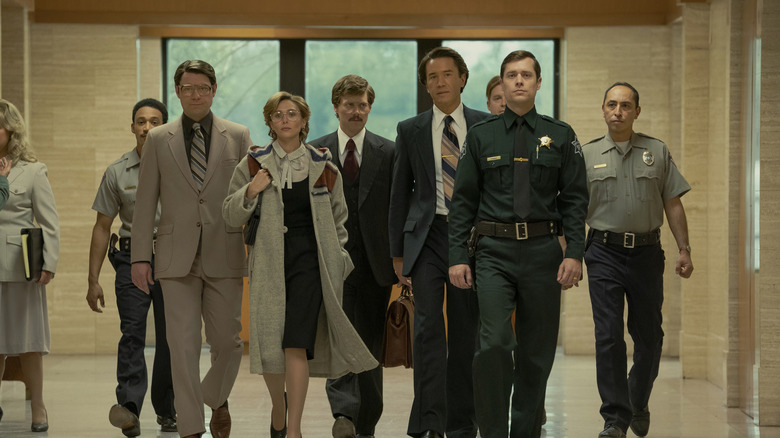Love And Death: Why Did Candy Montgomery Kill Betty Gore?
There's a lot to find fascinating about 1980's real-life frenemy drama-turned-true crime horror saga of Betty Gore and Candace "Candy" Montgomery, a pair of suburban Texas church buddies whose bitterly messy love triangle with Betty's husband ended in a Lizzie Borden-style massacre at Candy's hands (though this beat out Lizzie's crime by an additional 12 whacks). The grim saga's themes of duplicity, cultural performance, domestic malaise, and faith-based marital obligation have made it compelling enough to warrant three screenplay retellings through the years in CBS' Emmy-winning 1990 Barbara Hershey and Brian Dennehy-starring made-for-TV film "A Killing in a Small Town," Hulu's 2022 miniseries "Candy" starring Jessica Biel and Melanie Lynskey, and Max's 2023 miniseries "Love & Death" featuring Elizabeth Olsen, Jesse Plemons, and Lily Rabe.
Although the 1990 version renames its main characters and primarily focuses on the aftermath of the murder, both "Candy" and Max's "Love and Death" follow the rise and fall of Texas church moms' friendship, the corresponding rise and fall of a quid pro quo affair between Candy (Olsen) and beloved local schoolteacher Betty's husband, Allan (Plemons), and the shocking trial that followed Betty's (Rabe) death.
It's likely only the real Candy Montgomery will ever know the full truth about what happened on Betty's last day of life, though the Max series presents Candy's version of events when she pled not guilty. According to Montgomery, all of her forbidden cardio was an act of self-defense after an axe-wielding Betty confronted her about Candy's relationship with her husband, a relationship that was long over at that point. Montgomery would later claim that her act of massive violence was a childhood trauma-related response to being shushed by Betty, triggering her extreme reaction.
Despite the violent axe murder, Candy was acquitted of Betty's killing
As portrayed in "Love & Death," the real Candy Montgomery was tried for the murder of her one-time friend. The idea of an everyday housewife committing such a heinous act in the heart of small-town Texas proved to be a shock to suburbia, with spectators filling the courthouse for the duration of the eight-day trial and even lining up on the street outside, hoping to hear a guilty verdict. Instead, and certainly much to Montgomery's relief, their demands for justice would be met with an acquittal by the jury. But it was the beginning of the 1980s, an era when folks were still taking regression hypnosis — the pseudoscience that would help ignite the burgeoning Satanic Panic into a four-alarm case of mass hysteria that would ruin many lives — quite seriously.
During Candy's trial, the defense supported Montgomery's self-defense claim with hypnosis therapy meant to prove the housewife had gone into a dissociative state in a fight-or-flight moment, during which she hit Betty again and again, not out of rage but out of instinctual self-preservation. The jury bought the entire story, acquitting Montgomery after just three short hours of deliberation. Trial-goers expressed strong reactions to the acquittal, particularly given the mousy housewife's testimony revealing the tawdry details of her steamy extramarital affair with Allan. Their reactions during the trial had been raucous, punctuating the proceedings with groans, jeers, and name-calling aimed at Montgomery. When the verdict was read, an audible roar of disbelief erupted in the courtroom.
Despite public hate and even death threats, Candy moved on with her life. The Montgomerys eventually divorced in 1986, with Candy, perhaps ironically, going on to become a mental health worker who works with domestic abuse victims.

